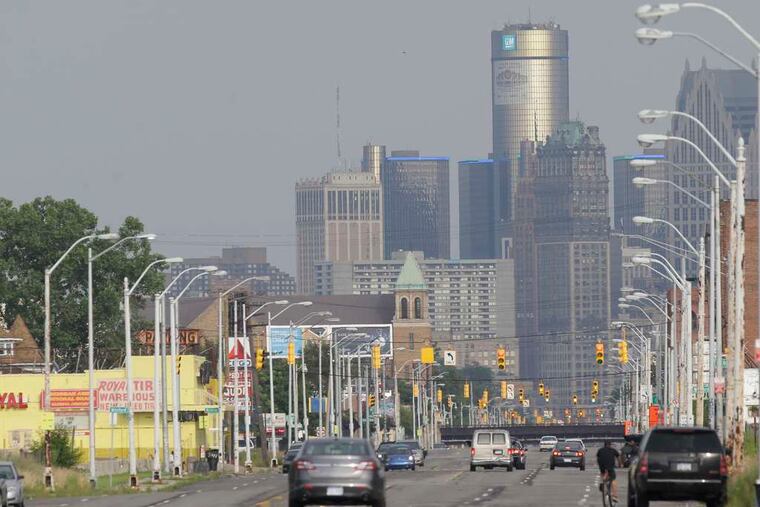Detroit and the dearth of urban policy
A national urban policy would not have saved Detroit, but the city's bankruptcy filing Thursday was a vivid reminder of how the problems of America's cities have long ceased to be a focal point of the political debate in presidential campaigns or the policy debate in Washington.

A national urban policy would not have saved Detroit, but the city's bankruptcy filing Thursday was a vivid reminder of how the problems of America's cities have long ceased to be a focal point of the political debate in presidential campaigns or the policy debate in Washington.
The closest the candidates came in 2012 to the specific topic of the cities was the contentious argument between President Obama and Mitt Romney over the federal bailout of the auto industry. Obama pummeled Romney for an article he had written for the New York Times in late 2008 opposing federal intervention. The headline, which Romney did not write, read: "Let Detroit Go Bankrupt."
It's notable in retrospect that Romney dealt solely with steps he thought were necessary - and unnecessary - to restore the vitality of the auto industry. He said nothing about the various ailments of urban decline and decay that had hollowed out the once-vibrant city of Detroit, which happened to be his hometown. Nor for that matter, did Obama.
Now Detroit itself has gone bankrupt. Thursday's filing, the largest municipal bankruptcy in the country's history, underscored that, while the federal government had the power and resources to help save General Motors, it seemed helpless in the face of Detroit's monumental fiscal problems. Vice President Joe Biden summed it up when asked Friday what the administration could do for Detroit: "We don't know."
It's not that Washington ignores the cities. There are many programs that have particular impact on big cities. Education policies and particularly Title I assistance to disadvantaged students play an important role in urban school districts, where the problems remain substantial. Housing policy is another, as are safety-net programs such as food stamps, welfare, and Medicaid. The president's stimulus program deposited considerable money into the cities.
Nor has federal policy, when the government has taken action, been an explicit benefit to cities, even in times when politicians thought about and talked about urban policy. In fact, some federal policies did just the opposite.
Post-war transportation policy - the building of superhighways in and around cities - built up suburban jurisdictions at the expense of the urban core, often accelerating white flight and leaving behind cities composed more of rich and poor than of the middle class.
Urban renewal, undertaken with good intentions, destroyed neighborhoods and packed poor people into high-rise ghettos in a number of big cities, leading to a concentration of poverty and crime.
Urban policy would not necessarily have saved Detroit, because other cities have rebounded from similar conditions without massive federal intervention or coordinated action.
Steel was once as central to Pittsburgh's economy and identity as automobiles have been to Detroit. When the steel industry imploded decades ago, Pittsburgh eventually reinvented itself. Its unemployment rate as of this spring was below 7 percent. Detroit's was 16 percent. Pittsburgh is a far smaller city than Detroit - it is not even among the nation's top 50 in population - but Detroit's decline still stands in contrast to what has happened elsewhere.
Other cities have dealt more effectively with their problems by tackling them with a local focus and a local consensus. Detroit was sometimes hampered by leadership inadequate to the problems, certainly during the tenure of Kwame Kilpatrick during the previous decade. The city hoped for a rebirth with the election of former National Basketball Association star Dave Bing, who came in with great goodwill, but he could not fend off the bankruptcy.
There is another reason the fate of cities is no longer a broad topic of discussion. Republicans feel little incentive to get behind initiatives aimed at the cities dominated by Democratic mayors and voters. Democratic politicians have stepped back from speaking about it, in part for fear of exacerbating racial differences or appearing more interested in the problems of urban minorities than middle-class suburbanites. Swing voters live in the suburbs, not the cities.
The days of an urban policy, as William Galston of the Brookings Institution put it Friday, are "long past." There is neither the political will nor the financial wherewithal. Detroit's bankruptcy, however much of the responsibility rests with bad management, political conflict, and poor governance there, puts the focus back on the importance of urban vitality and raises the question of what role the federal government has in helping to bring that about.